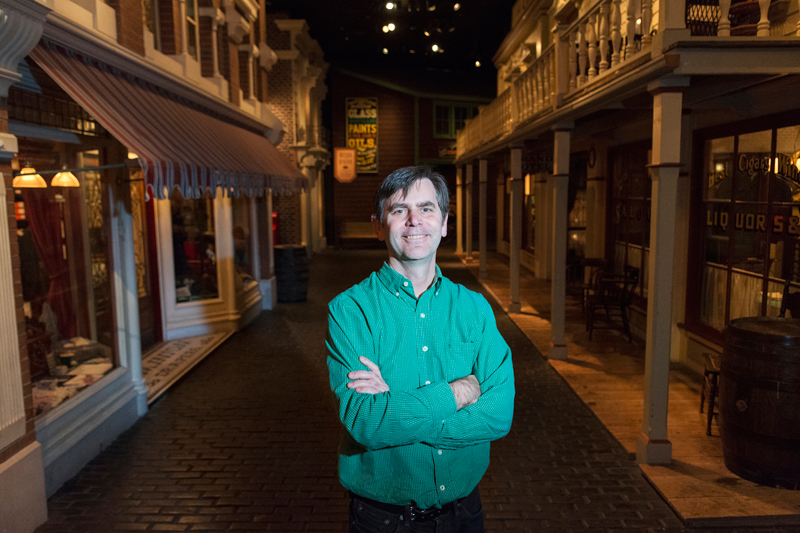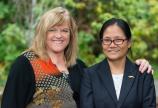2016 Provost’s Engaged Scholar recipients announced
Humanities, Human and Social Development
- Joy Poliquin

Dr. Jessica Ball (child and youth care) and Dr. John Lutz (history) have been named the 2016 recipients of the Provost's Engaged Scholar Award. This is the third year for the annual awards program, which celebrates the integration of outstanding scholarship, inspired teaching and real-life community engagement. It recognizes tenured faculty members who have achieved great distinction as community-engaged scholars.
Vice-President Academic and Provost Valerie Kuehne congratulated the recipients of the award. "Jessica Ball and John Lutz embody what it is to be a community-engaged scholar at UVic," she said. "They are both passionate about combining research, service and community partnerships to lead to positive societal change."
This year's awards were presented on March 10. Ball and Lutz were conferred the title of University of Victoria Engaged Scholar, which will be held for a period of five years and may be renewed after that time. They also each received a one-time award of $10,000 to support their research, teaching and community involvement.
Dr. Jessica Ball
For more than 30 years, Ball has been renowned on campus as a scholar with an outstanding record of groundbreaking research topics and methods, research-inspired teaching and creative knowledge mobilization in the service of Indigenous and ethnic minority communities in Canada and around the world.
After joining UVic's School of Child and Youth Care 20 years ago, Ball established the Early Childhood Development Intercultural Partnerships program. Through community-university research partnerships, Ball studies how policies and social processes marginalize certain children and families as well as ways to promote more equitable opportunities for quality of life. She includes production of accessible print and digital media into all her projects so that research findings, in her words, "have legs" in communities and with policy makers.
Ball is well-known internationally as a leader in research, knowledge dissemination and policy work on multilingualism and gender equity in early childhood development. In Canada, she conducted the first and only study on the experiences, goals and needs of Indigenous fathers in Canada as part of a national SSHRC-funded study involving 50 community partners. She was a co-investigator of a SSHRC-funded project where she partnered with five First Nations to determine culturally safe and valid approaches to developmental screening and assessment. She was also a Director of the First Nations Partnership Program, which delivered child and youth care courses in First Nations communities and incorporated Elders' teachings.
A standout scholar, Ball has published over 120 peer-reviewed publications and delivered over 100 conference presentations, keynotes, addresses and workshops related to community-engaged research.
Known as a responsive and collaborative resource for Indigenous communities across the country, Ball is described by Dr. Onowa McIvor, director of Indigenous education in the Faculty of Education, as "highly respected among Indigenous faculty and students at UVic . . . for her demonstrations of how university-based scholars can do meaningful research with Indigenous communities in a good way."
Dr. John Lutz
A professor of history at UVic since 1997, Lutz is an expert in the study of Indigenous-settler relations in the Pacific Northwest and has played a lead role in digitization projects related to this period. He is widely recognized as an innovative contributor not only to community and archives-based research in the aforementioned areas but also to the fields of digital history, community mapping and oral history.
Lutz approaches his research from a decentered perspective by working closely with Indigenous communities to document Indigenous views of colonial events and to unpack the historical significance of communicative acts, language and events.
As the author of the award-winning Makuk: A New History of Aboriginal-White Relations, Lutz conducted more than 45 interviews and performed extensive archival research. The book is recognized as a significant resource for its perspective on how Canada's Indigenous peoples fell from prosperity to poverty. As a participant in the Coasts Under Stress research initiative he worked with the Hartley Bay and Alert Bay communities and co-edited the volume Making and Moving Knowledge: Interdisciplinary and Community-based Research in a World on the Edge.
In 1998, Lutz co-founded the Ethnohistory Field School in collaboration with the St&o#180;:lõ First Nation in the Fraser Valley. Every second year, he travels to St&o#180;:lõ territory with a group of history graduate students to work on research projects identified by the St&o#180;:lõ. Students describe their experiences at this field school as transformative.
Additionally, Lutz is known for using the web to make historical resources available to the public-he is co-founder and co-director of the Great Unsolved Mysteries in Canadian History project, and was instrumental in the digitization of the British Colonist archive, the historical treasure trove of the Colonial Despatches project and A City Goes to War website about Victoria in WWI.
Lutz has served as principal investigator on more than a dozen national, federal and locally funded research projects that explore the innovative combination of historical research, community-based fieldwork and new computer technology, often working with local groups to create websites that illustrate local histories of Victoria, Vancouver Island and British Columbia.
Lutz is currently chair of the UVic Department of History and also served as acting director of the former Office of Community-Based Research at UVic from 2010-12, where he applied his community-based engagement skills to a range of projects.


